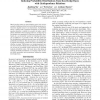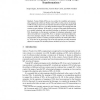31 search results - page 3 / 7 » Merging First-Order Knowledge Using Dilation Operators |
KES
2004
Springer
15 years 7 months ago
2004
Springer
Automatizing the merging of knowledgebases is an important step towards more efficient knowledge management. The cases when two knowledgebases need to be merged completely into a m...
107
click to vote
AAAI
2010
15 years 2 months ago
2010
When merging belief sets from different agents, the result is normally a consistent belief set in which the inconsistency between the original sources is not represented. As proba...
123
Voted
ENTCS
2011
14 years 5 months ago
2011
In this paper the machinery of Hybrid Logic and the logic of public announcements are merged. In order to bring the two logics together properly the underlying hybrid logic has be...
103
click to vote
GTTSE
2007
Springer
15 years 8 months ago
2007
Springer
Abstract. Feature Models (FMs) are a key artifact for variability and commonality management in Software Product Lines (SPLs). In this context, the merging of FMs is being recogniz...
117
click to vote
ATAL
2007
Springer
15 years 6 months ago
2007
Springer
Merging operators try to define the beliefs of a group of agents according to the beliefs of each member of the group. Several model-based propositional belief merging operators h...


